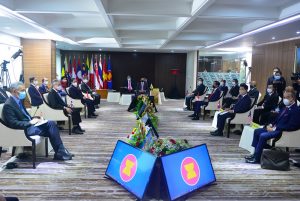Malaysia’s Foreign Minister Saifuddin Abdullah says that his government has engaged with Myanmar’s shadow opposition government, marking the first time that a leader from the Association of Southeast Asian Nations (ASEAN) has admitted to contacts with the National Unity Government (NUG).
The news, which was first reported by BenarNews, came as Saifuddin responded to an open letter from ASEAN Parliamentarians for Human Rights (APHR), a regional advocacy group, decrying the lack of action on ASEAN’s five-point Consensus peace plan and urging it to engage with the NUG, something that it has shied away from.
In the letter, APHR urged the bloc to “immediately and publicly meet with the NUG,” which “represents the democratically elected government and receives support from the majority of the Myanmar people.” The NUG was set up in April 2021 in order to coordinate resistance to the military junta that seized power in February of that year, and to compete with it for international recognition.
In a tweet responding to the open letter, Saifuddin said that he had “informally” met with the NUG’s Foreign Minister and the chairman of the National Unity Consultative Council (NUCC), which includes representatives of the NUG, civil society groups, ethnic armed organizations, and civil disobedience groups. The contacts took place via video conference prior to the last ASEAN Foreign Ministers’ Retreat in mid-February.
By regional standards, Saifuddin has been outspoken on the situation in Myanmar, which has descended into conflict and economic dysfunction in the 16 months since the coup. Speaking in parliament last October, he said that Malaysia could open talks with the NUG if the military junta continued to drag its feet on the implementation of ASEAN’s Five-Point Consensus.
While there have likely been sub rosa contacts between some ASEAN member states and the shadow government, Saifuddin’s tweet was the first time that a senior Southeast Asian official has admitted that such contacts have taken place. It raises the question of whether, after a year of sluggish implementation of ASEAN’s Five-Point Consensus, some Southeast Asian governments may begin to engage more openly and directly with the NUG.
Certainly, the current approach has borne little political fruit. To mark the anniversary of the Five-Point Consensus last week, Myanmar and regional human rights advocates criticized ASEAN for the lack of progress on the implementation of the plan, which aims to end the violence in Myanmar, and open the way to an inclusive dialogue involving “all parties” to the conflict.
The problem is that while ASEAN has entered into the talks in naïve good faith, the military junta has no interest in compromising on anything that might weaken its hold on power. It has pledged pro forma adherence to the Consensus, while redoubling its offensives on the various centers of opposition to its rule. According to the Assistance Association for Political Prisoners, the government has killed at least 1,798 people, while unleashing violent retribution on regions of the country where armed resistance has been particularly strong.
In its open letter, APHR made the reasonable argument that after a year of inaction by the junta, ASEAN should escalate its pressure on the military. “In this year, Commander in Chief Min Aung Hlaing has totally failed to implement any of the Five-Point Consensus. Given this failure, it is time for ASEAN to move on to sanctioning him for the continued suffering he is inflicting on the people of Myanmar and his blatant disregard for his regional partners.”
The APHR recommended that ASEAN suspend Myanmar’s membership in the bloc, impose regional travel bans on Min Aung Hlaing and senior junta officials, and introduce targeted sanctions on them.
Such pressure could make a real difference to the situation on the ground, especially given the military’s struggle to beat back the rising nationwide armed resistance to the military administration. Direct, formal talks between ASEAN governments and the NUG are also perfectly consistent with the Five-Point Consensus, and pivotal to any meaningful political resolution to Myanmar’s current crisis, as remote as that still seems given the zero-sum calculus of the main players.
In any event, however, it is hard to see ASEAN mustering the necessary consensus for these steps, given the de facto veto that every member state possesses. The more likely path is fragmentation, in which individual, more vocal ASEAN member states, such as Malaysia, Indonesia, and the Philippines, press ahead with more proactive policies, including some form of engagement with the NUG, while others take a softer, more hands-off approach. In this context, it is unlikely that the coming year will see significantly more progress on the implementation of the Five-Point Consensus than has taken place over the past year.

































